
This article first appeared in The Edge Financial Daily on July 5, 2017
KUALA LUMPUR: National House Buyers Association of Malaysia (HBA) said the middle-income group in Malaysia is in dire need of rent-to-own schemes, warning that the country could face a housing crisis in the form of a “homeless generation”.
HBA honorary secretary-general Chang Kim Loong said most new properties launched by developers are not within the affordable range, which he denoted to be between RM150,000 and RM300,000 with a build-up of at least 800 sq ft with three bedrooms.
“New properties launched by developers that fall within this price range are very rare. Even studio units with only one bedroom and [a] build-up of only 550 sq ft are sold in excess of RM500,000 in the Greater Klang Valley and are beyond the middle-income group’s reach.
“If this situation continues, Malaysia will face a housing crisis in the form of a ‘homeless generation’, where an entire generation or even generations of the rakyat will not be able to buy homes,” he said during his presentation at a dialogue on sustainable development of affordable housing yesterday.
To address the issue, Chang advocated for a rent-to-own scheme that extends to the middle-income group for affordable housing, noting the rising costs of living environment.
He added that a rent-to-own scheme would greatly assist the middle-income group, especially the “sandwich generation” — house buyers with young children and elderly parents to provide for.
“This group is in dire need of a rent-to-own scheme, since legally owning a house provides financial security in their golden years so they do not need to continue renting [a house] when they are no longer economically active or able to work.”
HBA proposed a holistic and sustainable approach be taken to address the issue, with the cooperation of all stakeholders including the federal and state governments, government-linked companies, financial institutions and property developers.
Besides rent-to-own schemes, Chang outlines other ways to potentially address the issue including providing preferential interest rates for developers and borrowers as well as giving incentives to property developers.
He explained that the government could alienate land to responsible housing developers at a lower price or lower conversion premiums on the condition that at least 70% of the land is used for affordable housing, or by offering fast-track approvals for projects involving affordable housing.
He added that the costs to lay the last mile of utilities for housing projects should be borne by utility companies, since these companies had been corporatised or privatised.
“In the past, utilities such as water, telephone and sewage were owned by the government and hence, developers were required to bear the costs to lay the last mile of such utilities.
“However, the government had privatised these utility companies, so it only makes sense that privatised utility companies start to bear the costs to lay the ‘last mile.”